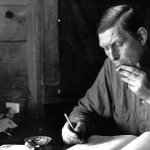(On this date, Goebbels moved into the lowest level of the bunker, taking a room opposite Hitler’s.)
Stand back, make way, you mindless scum,
Squire Voland the Seducer’s come—
Old Bock from Babelsberg whose tower
Falls silent now, whose shrunken power
For lies or lays comes hobbling home
Into this concrete catacomb.
Here’s Runty Joe, the cunt collector
Who grew to greatness, first erector
Of myths and missions, fibs and fables,
Who pulled the wool then turned the tables:
He piped the tunes and called the dance
Where shirtless countries lost their pants.
Goatfooted Pan, the nation’s gander
To whom Pan-Germans all played pander,
The jovial cob-swan quick to cover
Lida Baarova, his check-list lover;
Swellfoot the Tyrant, he could riddle
Men’s minds away, hi-diddle-diddle.
Our little Doctor, Joe the Gimp
Comes back to limpness and his limp:
Hephaistos, Vulcan the lame smith
Whose net of lies caught one true myth:
His wife, the famous beauty, whored
By numbskull Mars, the dull warlord.
What if I took my little fling
At conquest, at adventuring.
Pried the lid of Pandora’s box off—
There’s nothing there to bring your rocks off.
I never saw one fucking day
So fine I courted it to stay.
If I got snarled in my own mesh
Of thighs and bellies, who wants flesh?
I never hankered after matter.
Let Hermann swell up, grosser, fatter,
Weighed down by medals, houses, clothing;
They leave me lean, secured in loathing.
As a young man, I pricked the bubble
Of every creed; I saw that rubble
And offered myself the realms of earth
Just to say Yes. But what’s it worth?
No thank you, Ma’am. Behold the Ram
Of god: I doubt, therefore I am.
Here I forsake that long pricktease
Of histories, hopes, lusts, luxuries.
I come back to my first Ideal—
The vacancy that’s always real.
I sniffed out all life’s openings:
I loved only the holes in things.
So strip down one bare cell for this
Lay brother of the last abyss.
To me, still, all abstractions smell;
My head and nose clear in this cell
Of concrete, this confession booth
Where liars face up to blank truth.
My tongue lashed millions to the knife;
Here, I’ll hold hands with my soiled wife.
My lies piped men out, hot to slaughter;
Here, I’ll read stories to my daughter
Then hack off all relations, choose
Only the Nothing you can’t lose,
Send back this body, fixed in its
Infantile paralysis.
I was born small; I shall grow less
Till I burst into Nothingness,
That slot in time where only pure
Spirit extends, absent and sure.
I am that spirit that denies,
High Priest of Laymen, Prince of Lies.
Your house is founded on my rock;
Truth crows; now I deny my cock.
Jock of this walk, I turn down all,
Robbing my Peter to play Paul.
I give up all goods I possess
To build my faith on faithlessness.
Black Peter, I belie my Lord—
You’ve got to die to spread the Word.
Now the last act; there’s no sequel.
Soon, once more, all things shall be equal.


















Comment form: